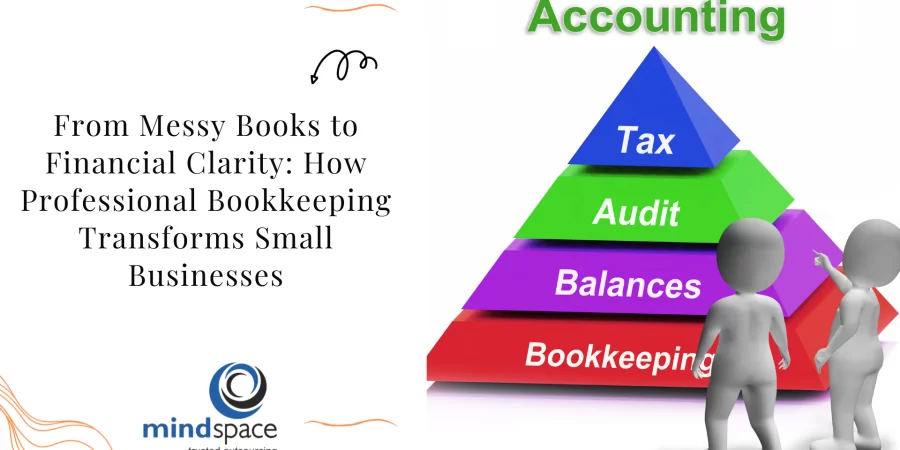From Messy Books to Financial Clarity: How Professional Bookkeeping Transforms Small Businesses
From Messy Books to Financial Clarity: How Professional Bookkeeping Transforms Small Businesses
Business people are aware of the various difficulties that are brought by the financial task and managing small businesses. Generally speaking, bookkeeping is one of those tasks that business people often overlook when they are consumed in building a brand and expanding their company. Building up a small business often comes with difficulties, and one of them is having disorderly accounts, which causes lots of strain, the wrong account, or no way of getting a good look at the company’s financial position. This is why professional bookkeeping can go such a long way in improving a given situation.
Business bookkeeping is more than entering transactions. It introduces order, concealing, and analytic techniques that put business owners in a position to make the right decisions. When carried out by professional bookkeepers, financial order out of organizational chaos can be achieved as follows.
1. The Need for Proper Bookkeeping
For small businesses, record-keeping is very important. Organizational financial records include expense records, records of cash flow, and records of revenue, as well as the trends in such revenues. Sadly, a lot of small business owners do not appreciate the value that comes with good bookkeeping. When that record keeping is questionable, it’s not easy to determine the inflows, the outflows, or the opportunities.
Untidy books can cause significant issues, for example, wrong tax returns, late payments to vendors, and many lost chances to expand. A professional bookkeeper gives you a plan that records each transaction as it happens so that no detail is overlooked. The accuracy of such estimations forms the basis on which other financial choices are made.
2. Deepening Cash Flow Management
Cash flow defines the rate of business life for any new small business. A company may be making good profits but still be in trouble if cash flow is not handled properly. Expert bookkeepers monitor the sources and uses of cash for business owners so the owners do not get caught unprepared by a cash or cash-equivalent deficiency or new costs. They can develop cash-flow projections to enable organizations to predict times of low cash flow and act in the right way.
Through proper cash flow management, the business organization is in a position not to be charged fees, most of which are very expensive. Also, the organization will be in a position to have a good relationship with its suppliers that will enable it to learn technology that is in the market, hence expanding its business opportunities. On the same note, well-arranged books guarantee easy evaluation of cash positions and determine when to reinvest in the business.
3. Tax Increase and Effects on State Revenue
Taxes remain one of the biggest issues for small business owners because, as these businesses mature, they come across more complex tax laws. Professional bookkeeping guarantees that any cash coming into or going out of the business is correctly recorded and that it meets every legal requirement necessary to be compliant with the laws on tax. It does this in a way that mitigates the two key disadvantages of having to complete often complex filings immediately preceding tax due dates or tax filing cutoffs or of running afoul of ‘penalty provisions.’.
They also know the allowable expenses to reduce the tax burden and maximize profits. Through knowledge of tax laws and appropriate filing periods, professional bookkeepers can alleviate the worry and potential lack of savings by the business and penalties and/or missed deductions.
4. Data-Driven Decision-Making
No one can make wise decisions if the financial information is disorganized with many missing links. Professional bookkeepers are effective in their ability to sort needed information and present it in a usable format. Some of the documents they produce include an income statement, balance sheet, and statement of cash flow, giving a real-time picture of a business.
Equipped with these findings, a business owner is in a position to understand which products or services contribute highly to the revenue or which expenses pull down the profitability most significantly and even get an idea of where adjustments need to be made to the budget. This in turn enables business owners to make preventive decisions rather than making decisions that are based on the current strategies and therefore promotes business sustainability.
5. Will decentralizing financial responsibilities help increase efficiency?
Most small businesses have owners working in various capacities, holding different roles, including marketing, customer relations, supply, and much more. Enumerating bookkeeping in this list can be daunting and, more to the point, unhelpful. Outsourcing bookkeeping is one of the strategies that relieve time-strapped business owners, allowing them to better attend to core business functions such as enhancing customer experiences, innovating the business line or product portfolios, and planning growth.
Outsourcing accounting services means that a person does not need to waste time doing the bookkeeping himself or herself, which takes a lot of time, especially when it is done together with other tasks. Business owners can rest assured that their affiliation to the management of their financial records is in professional hands; hence, they can be able to concentrate on the tasks that are most appropriate for them to do best.
6. Improvement of the relationship between firms and the financial institutions
For the companies looking for external financing, business records are very crucial. Banks, lenders, and investors require good, clean financial data to decide whether the business can qualify for loans or investments. Often, recorded cash lacks proper organization, which is a concern, and credit financing becomes more difficult to obtain.
Professional bookkeepers record a business’s financial transactions to present the face that will be accepted by lenders and investors. This not only raises the probability of getting the funding, but it can also reduce the rate being offered. When a business has accurate records that are free from a lot of complicated issues, this makes a business more credible to lenders and investors whom it approaches for support.
7. The case of planning for growth and scalability
When it comes to financial management, the environment of a small business becomes ever more complicated as the company expands. Yet, more clients certainly bring more revenues, and additional expenses put a new dimension into financial management. A professional bookkeeper ensures that a company is financially ready for growth by accurately organizing its records for growth. They create structures that make tracking easy across several accounts, products, or even geographical regions.
It is not unusual to have to reinvest in materials or people during the growth phase to support the business’s needs. Another benefit of having a proper financial plan is that by having a clear vision of where to spend the money, owners can guide growth so the business is sustainable and to its advantage.
8. Stress elimination and gaining a sense of security
A common and probably one of the most underestimated advantages of hiring professional bookkeepers is the impressive decrease in stress levels for an owner. There is satisfaction in understanding that financial records are well documented, current, and meeting all the legal requirements. Business owners and managers won’t need to be concerned if there is enough money available for paying employees or if the taxes have been calculated properly.
Financial stress often robs one of energy and slows the productivity that comes from the effective performance of a task. That means, with the help of a qualified specialist who is responsible for the books, the owners of the businesses can work comfortably because they are not alone, and someone helps them in cases when they do not know how to behave in specific situations.
9. Increasing Organizational Profitability as Enhanced by the Use of Financial Analysis
While accounting entails somebody simply entering data and performing calculations, bookkeepers do the same thing but focus on ways of making a business more profitable. It could include 1) discovery of possible ways through which the costs can be minimized; 2) finding of possible ways on how recurrent expenses can be addressed; or 3) notice of profitable trends that the business can capitalize on. By performing this type of analysis more often than in this example, business owners can apply the necessary ways of improving margins and thereby the bottom line.
10. Future Transitions or Sales
Professional bookkeeping is an important step for small business owners who are considering selling a company in the future or providing it to other managers. People with an interest in buying or taking over a business seek certainty in their numbers, and neat bookkeeping can make all the difference. Well-kept, consecutively prepared accounts show a genuine, real-time status of a business’s health, so the business is better placed to determine its worth when in negotiation.
Conclusion
The Long-Term Consequences of Professional Bookkeeping
Bookkeeping as a business activity is a business expense that pays off in the short term and the long term. To turn chaotic books into neat financial documents, they maintain the stability of cash flows in a business and bring it to optimal taxation and decision-making levels. These advantages help business owners to focus on growth and develop relationships with the institutions to accomplish their vision.
In the world of small business competition, the clearer one is, the more powerful he or she is. That structured thinking is what professional bookkeeping provides so that challenges can be faced, opportunities can be captured, and the fundamentals for sustainable business success can be put in place. Indeed, any organization that is in its infancy or is planning to grow will find it advantageous to have a professional bookkeeper on the team.


